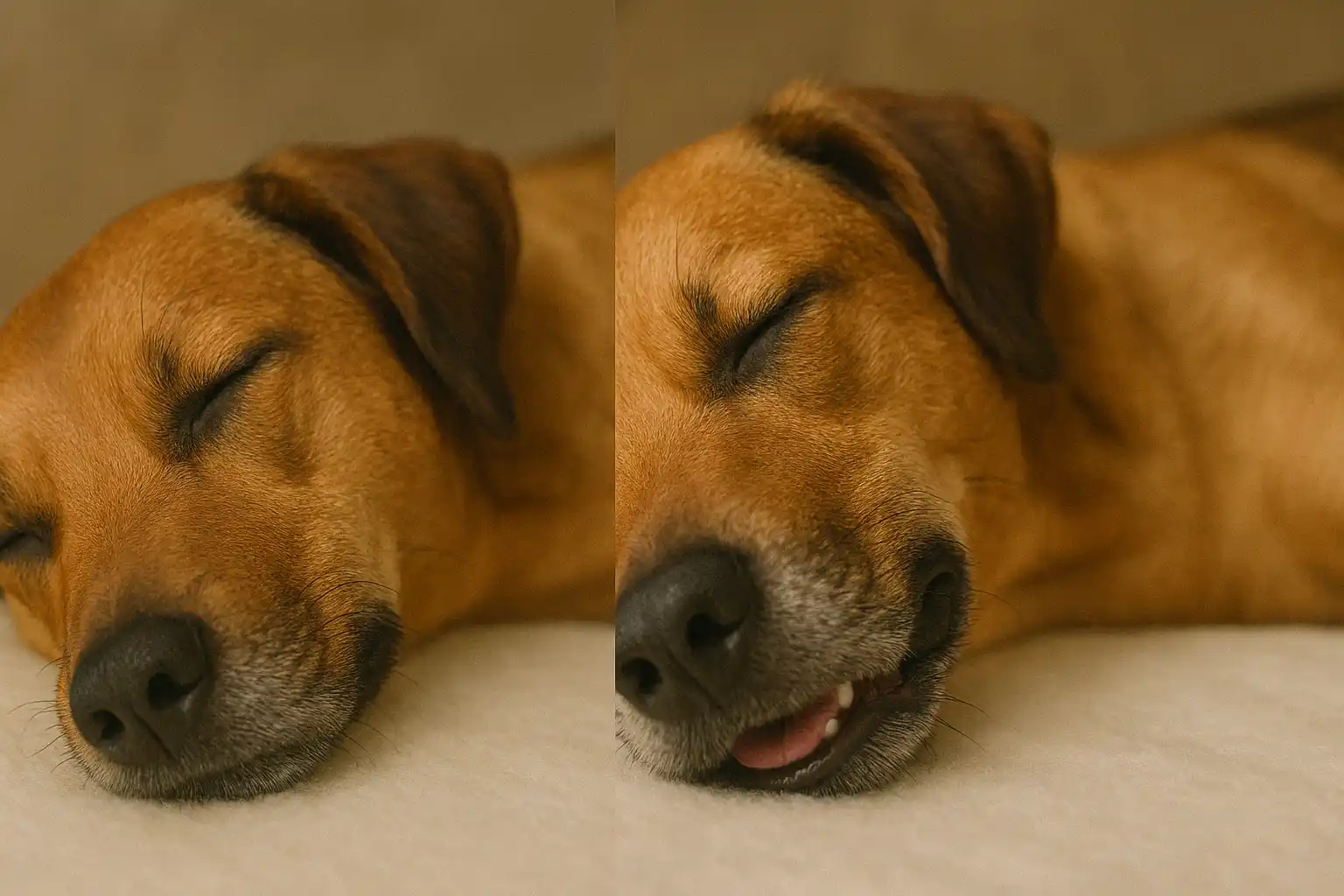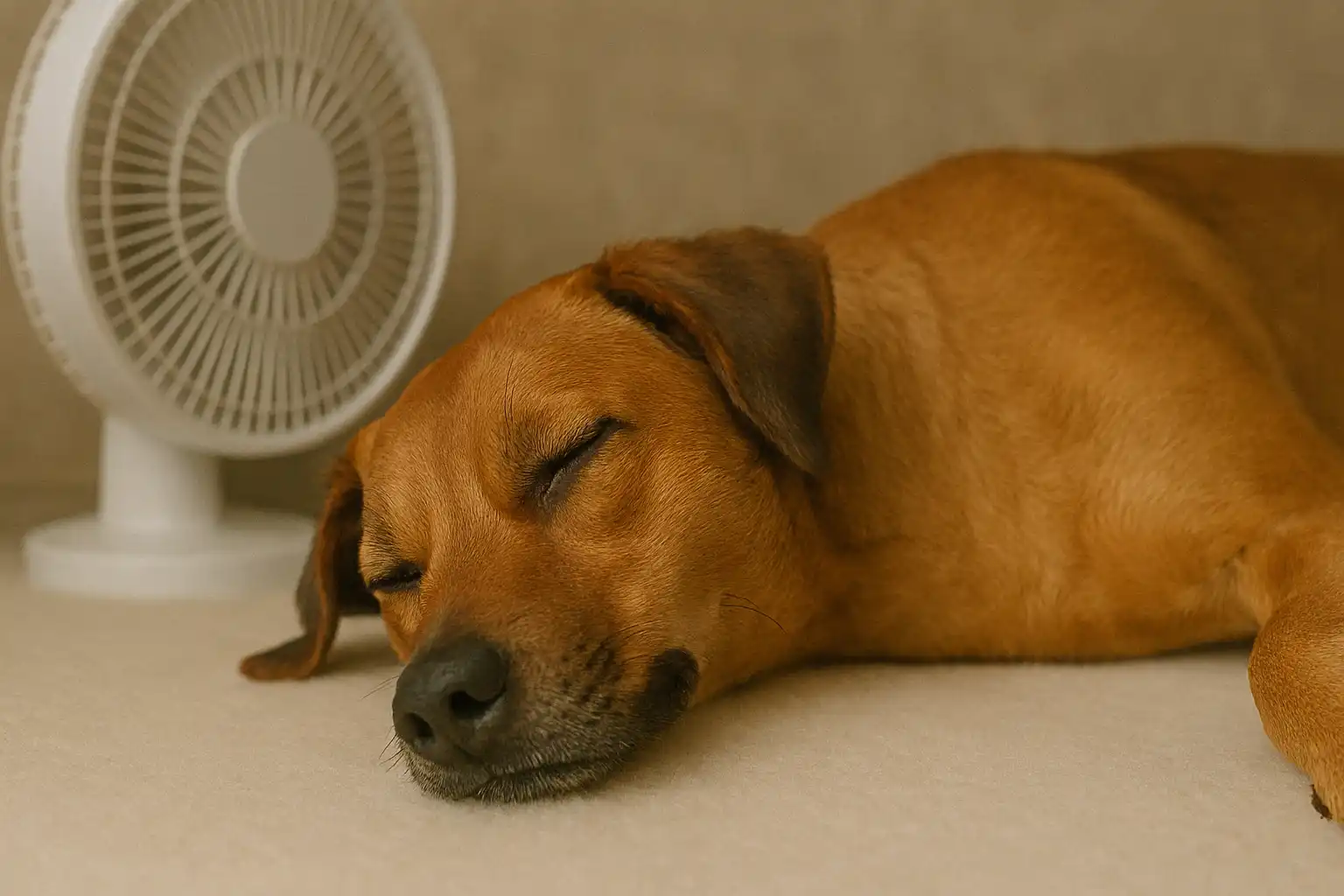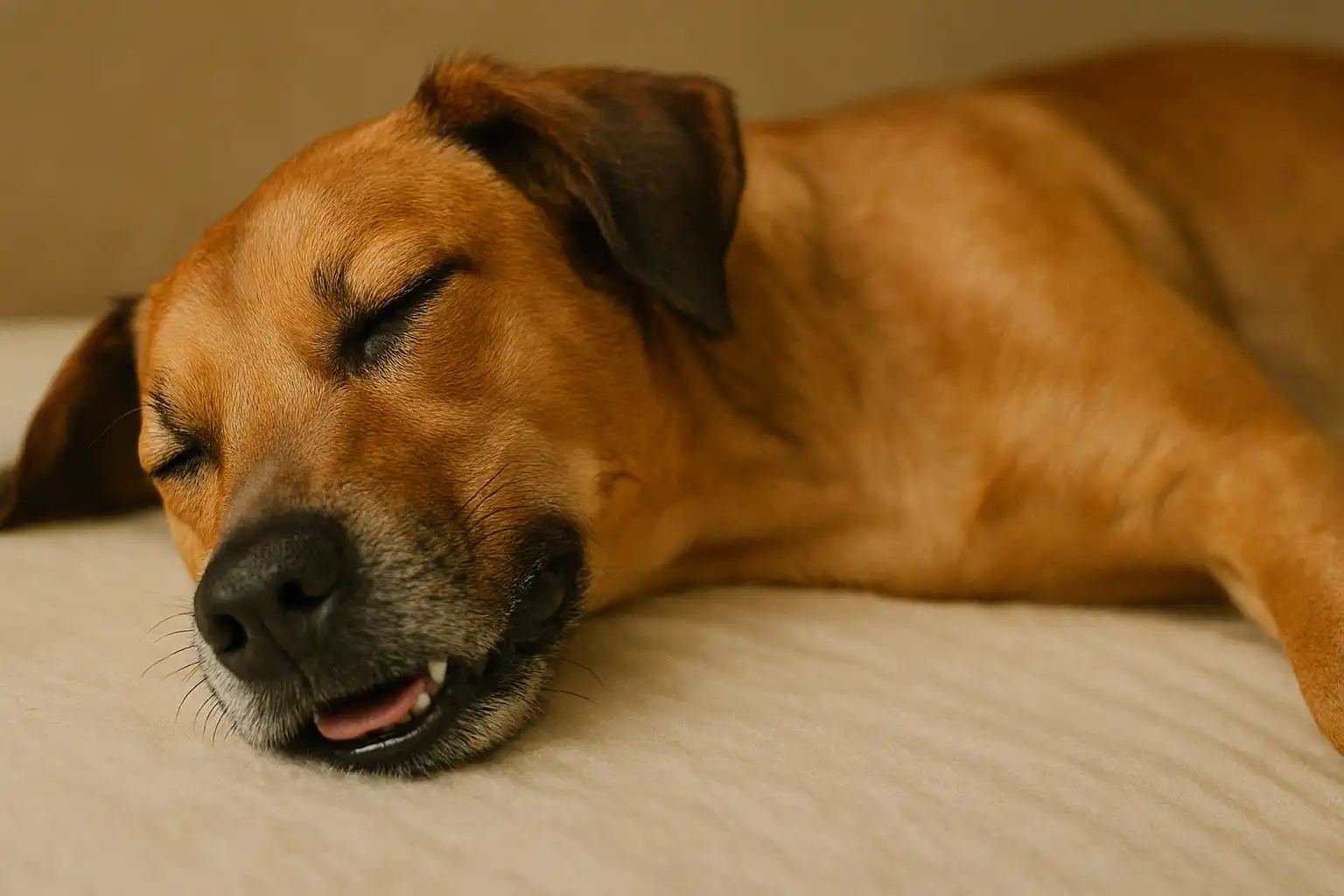Has your furry friend’s rapid nighttime breathing left you concerned? While some fast breathing during sleep is normal for dogs, it’s important to know when it might signal a health issue. This guide explores all possible causes of why your dog is breathing so fast while sleeping.
Reasons for Rapid Breathing in Sleeping Dogs
Understanding why is my dog breathing so fast while sleeping requires knowing the difference between normal sleep patterns and potential health concerns.
Normal Sleep Behavior in Dogs
Dogs cycle through different sleep stages, just like humans. When they enter REM (Rapid Eye Movement) sleep, their breathing patterns naturally change:
- Faster breathing rates become noticeable
- Small muscle twitches or leg movements occur
- Soft whimpering or barking sounds might emerge
- Eyelids may flutter behind closed eyes
The first time I noticed my Lab Max breathing so fast while sleeping, I panicked and woke him up. His confused expression made me feel guilty – I’d likely interrupted a normal dream about chasing squirrels!
Normal breathing rates for sleeping dogs typically range from 10-30 breaths per minute, depending on breed size. To check your dog’s resting respiratory rate, count their breaths (one rise and fall of the chest equals one breath) for 30 seconds during a calm but awake state, then multiply by two.
Factors Influencing Breathing Rates During Sleep
Several normal factors can explain why is my dog breathing so fast while sleeping:
- Recent exercise: Dogs who’ve just finished playing or walking may breathe faster during subsequent sleep as their body continues cooling down.
- Dream activity: Dogs experiencing exciting dreams typically breathe more rapidly during REM sleep.
- Sleep position: Certain sleeping positions can restrict airflow slightly, causing faster breathing as compensation.
- Age: Puppies naturally breathe faster than adult dogs, even during sleep.

Common Health Issues Related to Fast Breathing
While many cases of why is my dog breathing so fast while sleeping are normal, certain health conditions can cause concerning respiratory patterns.
Respiratory Conditions Affecting Dogs
Several respiratory issues might explain why is my dog breathing so fast while sleeping:
- Brachycephalic airway syndrome: Flat-faced breeds like Bulldogs, Pugs, and Boston Terriers often struggle with breathing due to their shortened airways, which can worsen during sleep.
- Bronchitis or pneumonia: Respiratory infections can cause increased breathing rates as the body tries to get more oxygen.
- Laryngeal paralysis: More common in older large breeds, this condition affects the larynx and can cause breathing difficulties that worsen during sleep.
- Chronic rhinitis: Ongoing nasal inflammation can force dogs to breathe through their mouths, altering their breathing patterns.
My neighbor’s elderly Beagle developed much faster breathing during sleep, which turned out to be early pneumonia. They caught it early because they paid attention to his sleep breathing patterns.
Heart Diseases and Their Impact on Breathing
Heart problems often first appear as breathing changes, particularly during rest or sleep:
- Congestive heart failure: When the heart doesn’t pump efficiently, fluid can build up in the lungs, causing the dog to breathe so fast while sleeping as the body tries to get more oxygen.
- Mitral valve disease: Common in small breeds, this progressive heart valve deterioration can lead to respiratory difficulties.
- Dilated cardiomyopathy: More common in large breeds, this heart muscle disease reduces the heart’s pumping efficiency, often causing respiratory compensation.
Heart issues frequently cause fast breathing that persists throughout all sleep cycles, not just during dreams. If you’re consistently noticing why is my dog breathing so fast while sleeping throughout the night, this warrants veterinary attention.
Stress and Anxiety in Dogs
Mental health can significantly impact physical symptoms, including breathing patterns during sleep.
How Stress Affects a Dog’s Breathing Patterns
Dogs experiencing chronic stress or anxiety may explain why is my dog breathing so fast while sleeping:
- Stress hormones like cortisol remain elevated
- Sleep quality diminishes, with fewer periods of deep restorative sleep
- Breathing patterns become irregular or consistently faster
- More frequent startling awake from sleep
My rescue dog Luna would breathe rapidly during sleep for months after adoption. As she gradually felt safer in our home, her sleep breathing normalized. Sometimes emotional healing takes time.
Identifying Signs of Anxiety in Sleeping Dogs
Beyond explaining why is my dog breathing so fast while sleeping, anxious dogs often show these sleep-related symptoms:
- Difficulty settling down to sleep
- Frequent position changes
- Tense body posture even while asleep
- Increased vigilance (waking at minor sounds)
- Nighttime pacing or restlessness
If your dog shows these signs alongside fast breathing during sleep, consider consulting with a behaviorist and your veterinarian about potential anxiety management strategies.
Temperature and Environment Effects
Environmental factors play a significant role in why is my dog breathing so fast while sleeping.
How Heat Influences Dog Breathing While Sleeping
Dogs primarily cool themselves through panting, and even during sleep, their bodies respond to heat:
- Higher ambient temperatures naturally increase breathing rate
- Dogs may breathe faster while sleeping in warm rooms
- Thick-coated breeds are particularly susceptible to heat-related rapid breathing
- Obesity can amplify heat sensitivity and increase breathing rates
I noticed my Husky’s breathing rate nearly doubled during summer naps compared to winter sleep, even with air conditioning. This perfectly demonstrates why is my dog breathing so fast while sleeping during warmer months. Always ensure your dog has a cool, comfortable sleeping area, especially for breeds with thick coats.
The Role of Humidity on Dog Respiratory Rates
Humidity levels affect breathing effort and can impact sleep breathing patterns:
- Very dry air can irritate airways, causing faster breathing
- High humidity makes cooling through panting less efficient, potentially explaining why is my dog breathing so fast while sleeping
- Some dogs with sensitivities may develop respiratory inflammation in extreme humidity conditions
Consider using a humidifier in dry climates or a dehumidifier in very damp environments to help your dog breathe comfortably during sleep.

Age and Size Correlation
Your dog’s age and size significantly influence what’s considered normal for sleeping respiratory rates.
Breathing Patterns in Puppies vs. Adult Dogs
Puppies naturally breathe faster than adult dogs, explaining why is my dog breathing so fast while sleeping if you have a young canine:
- Newborn puppies: 15-40 breaths per minute
- Young puppies (under 6 months): 15-35 breaths per minute
- Adult dogs: 10-30 breaths per minute
- Senior dogs: May vary widely based on health status
When I brought home my first puppy, I was alarmed by how quickly she breathed while sleeping. My vet reassured me this was perfectly normal—puppies have faster metabolisms and respiratory rates that gradually slow as they mature.
How Size Affects Breathing Rate in Different Breeds
Generally, smaller dogs breathe faster than larger breeds, which can explain why is my dog breathing so fast while sleeping if you have a smaller breed:
- Toy breeds (like Chihuahuas): 15-40 breaths per minute even during rest
- Medium breeds (like Beagles): 10-30 breaths per minute
- Giant breeds (like Great Danes): 8-20 breaths per minute
This size-based difference occurs because smaller dogs have faster metabolisms relative to their size. When evaluating why is my dog breathing so fast while sleeping, always consider their breed size as context.
When to Seek Veterinary Care
While many instances of why is my dog breathing so fast while sleeping are normal, certain signs warrant immediate professional attention.
Warning Signs Accompanying Fast Breathing in Dogs
Contact your vet right away if your observations of why is my dog breathing so fast while sleeping are accompanied by:
- Bluish gums or tongue (cyanosis)
- Excessive effort to breathe (chest heaving, extended neck)
- Abnormal breathing sounds (wheezing, crackling, or stridor)
- Inability to wake up normally
- Persistent rapid breathing even when awake
- Coughing or gagging
- Lethargy or weakness
- Reduced appetite or thirst
When my friend’s Corgi suddenly started breathing much faster during sleep and seemed unusually tired during the day, their veterinarian discovered early heart failure. Prompt treatment significantly improved his quality of life.
What to Expect During a Veterinary Consultation for Rapid Breathing
If you’re concerned about why is my dog breathing so fast while sleeping, be prepared to share:
- When you first noticed the rapid breathing
- Whether it occurs only during sleep or also when awake
- Any other symptoms you’ve observed
- Recent changes in environment, diet, or activity
- Video footage if possible (extremely helpful for intermittent issues)
Your veterinarian may recommend:
- Physical examination including careful auscultation (listening to heart and lungs)
- Blood work to check for infection or organ dysfunction
- Chest X-rays to examine heart size and lung patterns
- ECG or ultrasound for heart evaluation
- Oxygen therapy if breathing is significantly compromised
Remember that early detection of respiratory or cardiac issues can dramatically improve outcomes.
Understanding why is my dog breathing so fast while sleeping can range from perfectly normal dream activity to a sign of underlying health issues. By understanding your individual dog’s normal patterns and recognizing warning signs, you can make informed decisions about when to seek veterinary care.
Monitor your dog’s breathing occasionally during both awake rest and sleep to establish their baseline normal rate. This knowledge empowers you to notice meaningful changes that might require attention.
Most importantly, trust your instincts as a pet parent. You know your dog better than anyone, and if you’re concerned about why is my dog breathing so fast while sleeping, it’s always better to consult with your veterinarian for peace of mind.
Dogs can’t speak our language, but their body language often says it all—especially when it comes to their health. Whether it’s fast breathing during sleep, unusual postures, or subtle signs like excessive licking or ear twitching, these behaviors might be more than just quirks. They can be early indicators of discomfort, anxiety, or even an underlying medical condition.
If you’ve ever wondered what your dog’s body is trying to tell you, our Health Hub is here to help. It breaks down common physical signals and symptoms, so you can catch problems early—and care better.
FAQs
What is a normal breathing rate for dogs during sleep?
A normal breathing rate for dogs during sleep typically ranges from 10-30 breaths per minute, though smaller dogs and puppies tend to breathe faster than larger or adult dogs. If you’re wondering why is my dog breathing so fast while sleeping, count complete breath cycles (inhale and exhale) for 30 seconds and multiply by two to check if it’s within normal range.
Why is my dog breathing so fast while sleeping and dreaming?
Dogs breathe faster during REM sleep when they’re actively dreaming. The dream state causes increased brain activity and can trigger physical responses like rapid breathing, twitching paws, and even soft barking or whimpering sounds.
Could my dog’s fast breathing during sleep indicate pain?
Yes, pain can cause faster breathing even during sleep. If you’re noticing why is my dog breathing so fast while sleeping along with other signs of discomfort like restlessness, difficulty finding a comfortable position, whimpering, or reluctance to move when awake, consult your veterinarian to rule out pain-related issues.

